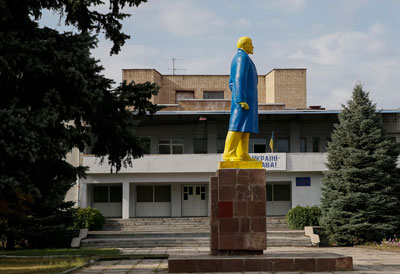New York, September 11, 2014–The Committee to Protect Journalists condemns today’s raid by Ukrainian security agents on the independent newspaper Vesti as well as moves by Ukrainian authorities to bar entry to dozens of Russian journalists and media workers.
Around 11 a.m. today, agents from the security service known as SBU searched Vesti‘s newsroom in Kiev and confiscated its computer servers, shutting down the newspaper’s website.
According to news reports and the Kiev-based press freedom group Institute of Mass Information, the SBU conducted the search as part of a criminal investigation into the newspaper’s alleged violations of Ukraine’s territorial integrity. The crime of violating territorial integrity carries punishment of up to five years in prison, according to Ukraine’s criminal code.
In a statement, an SBU spokesman confirmed that the raid was conducted in connection to the investigation, but did not explain which actions by Vesti or its staffers are alleged to have violated Ukraine’s territorial integrity. Local journalists told CPJ that Vesti has a pro-Russian stance.
According to the Institute of Mass Information, Igor Guzhva, Vesti‘s chief editor, posted on his Facebook page that the accusations stem from interviews with pro-Russia separatists in the eastern Donetsk and Lugansk regions. He said the articles were originally published by the Russian independent news website Russkiy Reporter, and his newspaper re-published them in April and July.
“We call on Ukrainian authorities to stop harassing Vesti and to return all of the newspaper’s confiscated equipment,” said Muzaffar Suleymanov, CPJ’s Europe and Central Asia research associate. “The authorities should also allow Russian journalists into the country to cover the conflict–the public can decide which reports to trust.”
In May, Ukraine’s fiscal police raided Vesti‘s newsroom and briefly disrupted journalists’ work after accusing the newspaper of money laundering. According to today’s SBU statement, authorities concluded that investigation and filed its findings with a Kiev court, which will decide whether to proceed with a case, local press reported.
Also today, Yuri Artemenko, head of Ukraine’s National Council on Television and Radio, announced that the SBU has banned 35 Russian journalists and media workers from entering Ukraine, the Institute of Mass Information reported. Ukrainian media said the 35 came from a list of 49 journalists and media workers that Artemenko put forward to the SBU in August. Artemenko did not name the journalists or explain the reasons behind the ban, but said they are barred from Ukraine for three to five years, reports said.
The conflict in Ukraine–which has claimed lives of at least seven journalists and media workers–has also opened a deep divide among regional journalists, CPJ found in a fact-finding mission to Kiev in July. According to international news outlets and Ukrainian journalists, Russian news outlets–the majority of which are controlled by the Kremlin–have waged a propaganda war against Ukraine, while many Ukrainian journalists have sided with authorities under the banner of war against pro-Russia separatists rather than holding their government to account.
- For more information on Ukraine, see CPJ’s Ukraine page.
